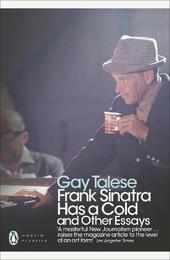
|
Frank Sinatra Has a Cold: And Other Essays
Paperback / softback
Main Details
| Title |
Frank Sinatra Has a Cold: And Other Essays
|
| Authors and Contributors |
By (author) Gay Talese
|
| Series | Penguin Modern Classics |
|---|
| Physical Properties |
| Format:Paperback / softback | | Pages:208 | | Dimensions(mm): Height 198,Width 129 |
|
| Category/Genre | Literary essays |
|---|
| ISBN/Barcode |
9780141194158
|
| Classifications | Dewey:814.54 |
|---|
| Audience | |
|---|
|
Publishing Details |
| Publisher |
Penguin Books Ltd
|
| Imprint |
Penguin Classics
|
| Publication Date |
3 March 2011 |
| Publication Country |
United Kingdom
|
Description
A selection of witty and provocative essays from the father of New Journalism, new to Penguin Modern Classics Gay Talese is the father of American New Journalism, who transformed traditional reportage with his vivid scene-setting, sharp observation and rich storytelling. His 1966 piece for Esquire, one of the most celebrated magazine articles ever published, describes a morose Frank Sinatra silently nursing a glass of bourbon, struck down with a cold and unable to sing, like 'Picasso without paint, Ferrari without fuel - only worse'. The other writings in this selection include a description of a meeting between two legends, Fidel Castro and Muhammad Ali; a brilliantly witty dissection of the offices of Vogue magazine; an account of travelling to Ireland with hellraiser Peter O'Toole; and a profile of fading baseball star Joe DiMaggio, which turns into a moving, immaculately-crafted meditation on celebrity.
Author Biography
Gay Talese (born February 7, 1932) is an American author. He wrote for The New York Times in the early 1960s and helped to define literary journalism or 'new nonfiction reportage', also known as New Journalism. His most famous articles are about Joe DiMaggio, Dean Martin and Frank Sinatra. He lives in New York with his wife, Nan Talese.
Reviews'The best non-fiction writer in America' * Mario Puzo * 'A masterful New Journalism pioneer ... raises the magazine article to the level of an art form' * Los Angeles Times *
|